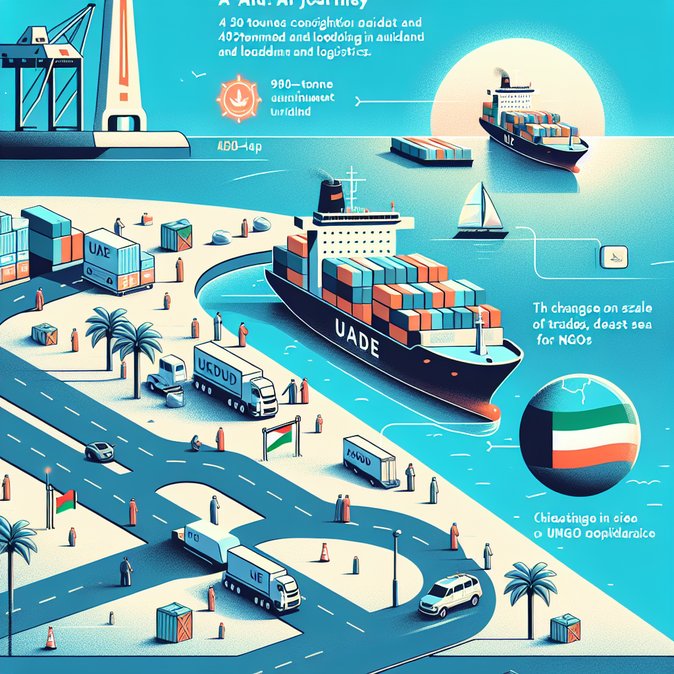
Cyprus cemented its emerging role as the Eastern Mediterranean’s logistics hub on 2 November 2025 when a convoy carrying 940 tonnes of food and shelter material reached Israel’s Port of Ashdod for onward distribution in Gaza. The shipment—organised under **Operation Amalthea**—sailed from Limassol on 31 October and was unloaded in the early hours of 2 November, the Foreign Ministry confirmed in a post that also thanked the United Arab Emirates and the UN Office for Project Services (UNOPS) for operational support.
Amalthea was conceived in late 2024 as a civilian maritime corridor that would allow vetted cargo to bypass land crossings frequently closed for security reasons. Since its pilot run in February 2025, the corridor has channelled more than 27,000 tonnes of relief supplies, with Cyprus providing warehousing, security screening and customs clearance. Under the scheme, cargo is pre-inspected in Limassol by a joint team of Cypriot customs officers, EU Frontex specialists and Israeli security personnel, allowing for expedited discharge in Ashdod without additional checks.
![Operation Amalthea: Cyprus dispatches 940 tonnes of aid to Gaza via new maritime corridor]()
For Cyprus, the project is a diplomatic and economic win. Limassol port has recorded a 15 percent year-on-year increase in throughput, and logistics providers such as DP World and Salamis Shipping have opened dedicated Amalthea service desks. Foreign Minister Constantinos Kombos noted that the initiative demonstrates Cyprus’ “unique value as a bridge between Europe and the Middle East” and said the government is exploring a permanent humanitarian logistics centre near Vasilikos.
Mobility and assignment managers should note that the corridor operates under EU customs rules; ATA Carnet procedures apply for temporary export items such as generators and medical equipment. Companies moving staff or cargo through Limassol are advised to pre-book inspection slots and factor in heightened security measures around the port area. The MFA also reminded NGOs that all personnel transiting to Gaza must obtain special area permits from Israeli and Palestinian authorities.
With hostilities in Gaza intermittently disrupting traditional land routes, Operation Amalthea is likely to remain a key artery for humanitarian and commercial flows. Analysts expect Cyprus to leverage the experience to pitch similar maritime corridors for Lebanon and Syria, further bolstering its strategic relevance in regional mobility networks.
Amalthea was conceived in late 2024 as a civilian maritime corridor that would allow vetted cargo to bypass land crossings frequently closed for security reasons. Since its pilot run in February 2025, the corridor has channelled more than 27,000 tonnes of relief supplies, with Cyprus providing warehousing, security screening and customs clearance. Under the scheme, cargo is pre-inspected in Limassol by a joint team of Cypriot customs officers, EU Frontex specialists and Israeli security personnel, allowing for expedited discharge in Ashdod without additional checks.

For Cyprus, the project is a diplomatic and economic win. Limassol port has recorded a 15 percent year-on-year increase in throughput, and logistics providers such as DP World and Salamis Shipping have opened dedicated Amalthea service desks. Foreign Minister Constantinos Kombos noted that the initiative demonstrates Cyprus’ “unique value as a bridge between Europe and the Middle East” and said the government is exploring a permanent humanitarian logistics centre near Vasilikos.
Mobility and assignment managers should note that the corridor operates under EU customs rules; ATA Carnet procedures apply for temporary export items such as generators and medical equipment. Companies moving staff or cargo through Limassol are advised to pre-book inspection slots and factor in heightened security measures around the port area. The MFA also reminded NGOs that all personnel transiting to Gaza must obtain special area permits from Israeli and Palestinian authorities.
With hostilities in Gaza intermittently disrupting traditional land routes, Operation Amalthea is likely to remain a key artery for humanitarian and commercial flows. Analysts expect Cyprus to leverage the experience to pitch similar maritime corridors for Lebanon and Syria, further bolstering its strategic relevance in regional mobility networks.









